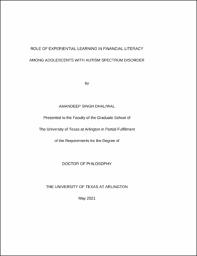
ATTENTION: The works hosted here are being migrated to a new repository that will consolidate resources, improve discoverability, and better show UTA's research impact on the global community. We will update authors as the migration progresses. Please see MavMatrix for more information.
Show simple item record
| dc.contributor.advisor | Levine , Daniel S | |
| dc.creator | Dhaliwal, Amandeep Singh | |
| dc.date.accessioned | 2021-06-01T17:41:57Z | |
| dc.date.available | 2021-06-01T17:41:57Z | |
| dc.date.created | 2021-05 | |
| dc.date.issued | 2021-05-06 | |
| dc.date.submitted | May 2021 | |
| dc.identifier.uri | http://hdl.handle.net/10106/29782 | |
| dc.description.abstract | Autism Spectrum Disorder (ASD) is a developmental disorder with deficits in social and communication skills with repetitive or restricted behaviors. High functioning ASD individuals report poor financial literacy as a hindrance to independent living (Cheak-Zamora et al., 2017). Study 1 (N = 379) measured a construct of Autism Spectrum Quotient (ASQ), autistic traits such as difficulties with attention switching, social skills, and communication in individuals with average intelligence. Results indicate that ASQ is negatively correlated with executive functioning and poor executive functioning predicted poor money management in individuals with more autistic traits. Low levels of financial literacy result in suboptimal financial behaviors that lead to reduced long-term financial well-being. Educating adolescents with ASD is challenging because the financial literacy curriculum is based on passive learning strategies, whereas ASD students learn best from active learning. Study 2 evaluated the effectiveness of a simulation designed to improve financial literacy based on the Experiential learning theory (ELT; Kolb & Kolb 2005) and the Experiential gaming model (Kiili, 2005) ─ active learning strategy. Participants (N = 31), thirteen autistic and eighteen age and grade matched neurotypical adolescents, were recruited from the local school district. Results indicate that simulation effectively taught financial responsibility as indicated by timely “hypothetical bill” payments. Additionally, the simulation was effective in teaching budgeting skills to both groups. However, there were no improvements in debt management ability. Furthermore, the simulation tested prospective memory in both autistic and neurotypical students. Prospective memory is remembering to act in the future either at a specific time (time-based) or upon the occurrence of a pre-specified event (event-based). Simulation improved the performance of time-based PM tasks over five days but did not improve the performance of event-based PM tasks. | |
| dc.format.mimetype | application/pdf | |
| dc.language.iso | en_US | |
| dc.subject | Autism spectrum quotient | |
| dc.subject | Experiential learning | |
| dc.subject | Financial literacy | |
| dc.subject | Autism spectrum disorder | |
| dc.title | ROLE OF EXPERIENTIAL LEARNING IN FINANCIAL LITERACY AMONG ADOLESCENTS WITH AUTISM SPECTRUM DISORDER | |
| dc.type | Thesis | |
| dc.degree.department | Psychology | |
| dc.degree.name | Doctor of Philosophy in Psychology | |
| dc.date.updated | 2021-06-01T17:41:58Z | |
| thesis.degree.department | Psychology | |
| thesis.degree.grantor | The University of Texas at Arlington | |
| thesis.degree.level | Doctoral | |
| thesis.degree.name | Doctor of Philosophy in Psychology | |
| dc.type.material | text | |
Files in this item
- Name:
- DHALIWAL-DISSERTATION-2021.pdf
- Size:
- 1.801Mb
- Format:
- PDF
This item appears in the following Collection(s)
Show simple item record


